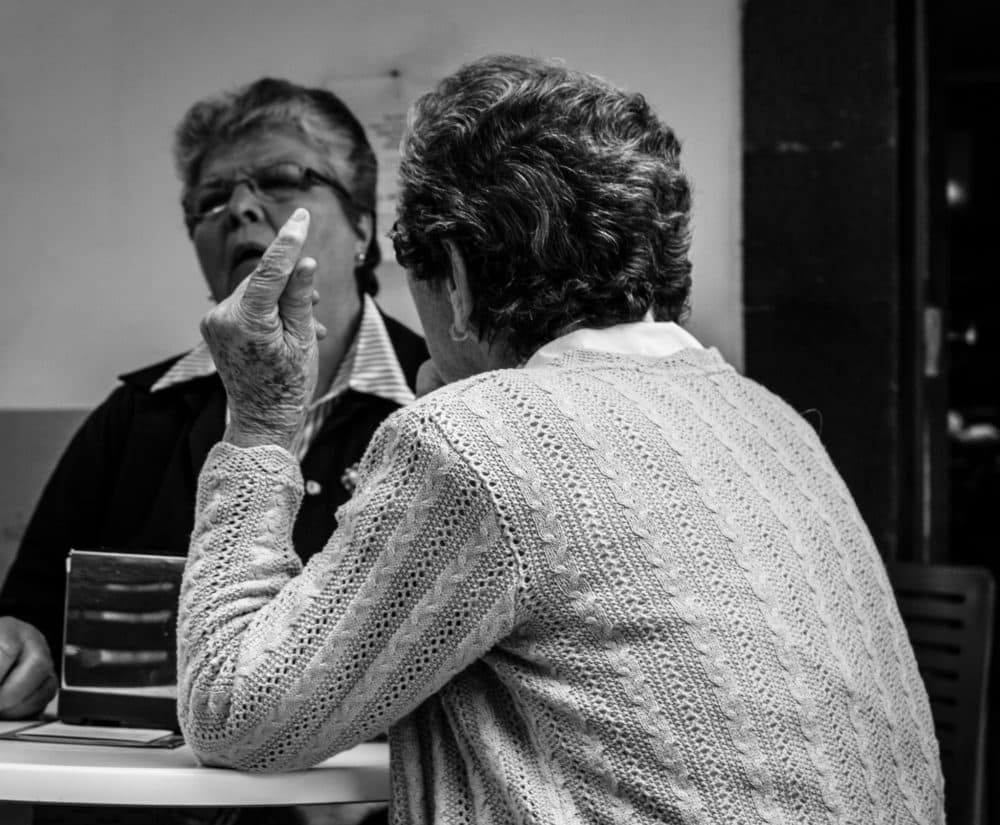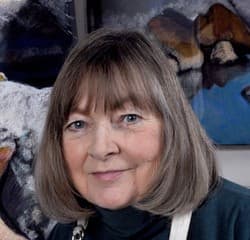Advertisement
Commentary
When Everything Else Seems Lost, Our Stories Can Make Us Whole

They straggle in — on their own steam, bent over walkers or pushed in wheelchairs. We’ve recently changed the title of the workshop from "Memoir Writing" to "Telling Our Stories" because most members of the class have a hard time just writing their names. All of them have some level of dementia. They also share past service to our country. Today there is only one woman — she’d been in the Coast Guard, and she sleeps for most of the hour.
A new member tells me he doesn’t choose to remember from one day to the next. “When I wake up I thank God for the morning and when I go to sleep I thank Him for the day.” Gratitude is a sentiment not often in evidence here. I ask him to stay and listen.
There is a nucleus of regulars whose names I remember and occasional attendees whose names I sometimes forget. They often refer to me as “young lady,” though I am actually close in age to many of them.
When my husband first came to this facility, I wanted to find a way to capture some of the memories he still had. It soon became clear, however, that what my husband wanted for himself was to advance his vendetta against the dead Red Sox player Ted Williams, to whom he had recently taken a strong dislike. Luckily, he eventually let go of this obsession and began to reminisce about growing up in Dorchester.
There are flashes of amazing insight, sudden bursts of abstract thinking and snippets of history that astonish me.
There are a number of Boston-area natives in the group from Roxbury, Melrose, Dorchester, Chelsea. Many have had similar childhoods in triple-deckers and sprawling neighborhoods, gone swimming at Malibu Beach or door-to-door selling The Saturday Evening Post.
Oscar tells us of his childhood in Roxbury and how he would hitch a ride on the backs of trolley cars, his voice is ripe with excitement. He describes a bustling home where he was the oldest of nine, the way the neighborhood women gathered for tea each morning and looked out for one another’s children. “What a wonderful life,” he proclaims. If there were adversities, he seems to remember none of them.
Successful topics of conversation have centered on “Storms that changed my life,” “The car I valued most,” “Summer” and “Where were you when JFK died?”

One day a very elderly gentleman is wheeled in and declares, “I don’t know why I’m here. I don’t remember anything.” On that day we are discussing our most memorable jobs. Two men discover they’d both worked for Polaroid and they share little known facts of the rise and fall of that company. An ex-Navy man describes the dangerous work of dismantling minefields. Alma says she has been in the army ever since World War II. John had been the chief of police before becoming a history teacher.
The newcomer suddenly interrupts to say, “I was a poet. Oh, that wasn’t my real job. But one day I wrote this wonderful poem.” He recites it in its entirety. “For 20 years,” he continues, “I tried to write another just as good. I would lock myself in my room for hours to work on it. But I never could.” When he looks up there is serious disappointment in his cloudy eyes. At the next session, he cannot recall his poem or what he’d told us, but for that brief moment he’d let us into feelings and thoughts that were still there. He’d been important in our eyes and in his own.
Advertisement
On the day we are talking about places we’ve been, I’m amazed at the adventures. Terry has climbed some of the highest mountains in the world; Manny has lived much of his adult life in Asia. I prompt my husband to tell of our trips to Spain and Italy, and am saddened to find that he no longer can. His memories now center on his childhood — that is true with many members of the group, whose earliest recollections cling like the last leafs on a tree.
... for that brief moment he’d let us into feelings and thoughts that were still there. He’d been important in our eyes and in his own.
When I discover that what we’re doing is called “narrative therapy” it occurs to me that I’m probably not qualified to lead it. I write fiction and children’s books and teach creative writing. One man chuckled when I used the term historical fiction. He couldn’t see how the juxtaposition of those two words made any sense, and suddenly, neither could I.
Often there is more collective wisdom in this room than I have ever encountered in any one place. There are flashes of amazing insight, sudden bursts of abstract thinking and snippets of history that astonish me. The conversations that ensue are deep and lively and respectful. Though participants do nod off at times, they often spring back to life to offer some unexpected tidbit. Most are hard of hearing, a few have difficulty with speech, but with unbelievable patience on the part of the group, they are listened to and heard.
On the afternoon we are discussing the topic of summer, the session has gone over and when I call a halt, the new member — the man who chooses not to remember anything — stands up and announces that he plans to spend the next two weeks organizing his thoughts. “I met important men,” he says, “JFK. Walter Cronkite. I helped establish missile sites all over the globe. You’ll be amazed at what I have to tell.”
